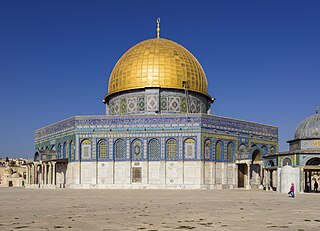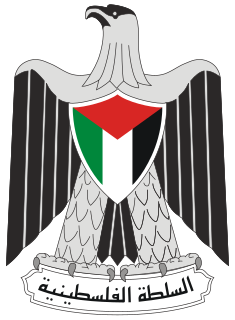Related Research Articles

The Palestine Liberation Organization is an organization founded in 1964 with the purpose of the Arab unity and the liberation of Palestine. It is recognized as the sole legitimate representative of the Palestinian people by over 100 states with which it holds diplomatic relations, and, as the official government of the State of Palestine, has enjoyed observer status at the United Nations since 1974. Due to its activities, including violence aimed at Israeli civilians, the PLO was declared by the United States to be a terrorist organization in 1987, although a presidential waiver has permitted contact since 1988. In 1993, the PLO recognized Israel's right to exist in peace, accepted UN Security Council resolutions 242 and 338, and rejected "violence and terrorism". In response, Israel officially recognized the PLO as the representative of the Palestinian people. However, the PLO has employed violence in the years since 1993, particularly during the 2000–2005 Al-Aqsa Intifada. On 29 October 2018, the Palestinian Central Council suspended the recognition of Israel and halted security and economic coordination in all its forms with it.

The history of the State of Palestine describes the creation and evolution of the State of Palestine in the West Bank and Gaza Strip.

The term "Palestinian territories" has been used for many years to describe the territories occupied by Israel since 1967 within the former British Mandate for Palestine, namely the West Bank and the Gaza Strip. The International Court of Justice (ICJ) has referred to the West Bank, including East Jerusalem, as "the Occupied Palestinian Territory" and this term was used as the legal definition by the ICJ in the ruling in July 2004. More recently, the official United Nations (UN) terminology has been used, occupied Palestinian territory increasingly replacing other terms since 1999. The European Union (EU) also has adopted this usage. The term Occupied Palestinian Territory was used by the UN and other international organizations between October 1999 and December 2012 to refer to areas controlled by the Palestinian National Authority. The EU had utilized a parallel term Palestinian Authority territories occasionally during the same period.

Palestine, officially the State of Palestine is a de jure sovereign state in Western Asia, which is officially governed by the Palestine Liberation Organization (PLO) and claims the West Bank and Gaza Strip; however, de facto administrative control over the 165 Palestinian enclaves in the West Bank is held by the Palestinian National Authority, while Gaza is ruled by Hamas. Although Palestine claims Jerusalem as its capital, the city is under the control of Israel; Palestine and Israel's claims to the city are not recognized by the international community. The territory claimed by Palestine has been occupied by Israel since the Six-Day War in 1967. Palestine has a population of 5,051,953 as of February 2020, ranked 121st in the world.

The occupation of the Gaza Strip by the United Arab Republic refers to the time period in which the present-day Palestinian territory known as the Gaza Strip was occupied by Egyptian forces of the United Arab Republic from 1949 to 1967. The Egyptian occupation of Gaza began with the inception of the territory in 1949 following the First Arab–Israeli War, and ended after Egypt's defeat to Israel in the Third Arab–Israeli War of 1967, after which the Israeli occupation of the Gaza Strip commenced. Egyptian rule in Gaza before the 1967 war had been continuous with the exception of a brief period from October 1956 to March 1957, when Israel invaded and occupied Gaza as well as the Sinai Peninsula during the Suez Crisis.
The Arab League was formed in Cairo on 22 March 1945 with six members: Egypt, Iraq, Transjordan, Lebanon, Saudi Arabia, and Syria. Yemen joined on 5 May 1945. Since its formation the Arab League has promoted the Palestinian Arab cause in the Israeli–Palestinian conflict, including by the imposing the Arab League boycott of Israel. The Arab League opposed the United Nations Partition Plan for Palestine in 1947. On 15 May 1948, the then seven Arab League members coordinated an invasion of what was by then the former British Mandate, marking the start of the 1948 Arab–Israeli War.
The International law bearing on issues of Arab–Israeli conflict, which became a major arena of regional and international tension since the birth of Israel in 1948, resulting in several disputes between a number of Arab countries and Israel.

The Palestinian government is the government of the Palestinian Authority or State of Palestine. The Executive Committee of the Palestine Liberation Organization (EC) is the highest executive body of the Palestine Liberation Organization and acts as the government. Since June 2007, there have been two separate administrations in Palestine, one in the West Bank and the other in the Gaza Strip. The government on the West Bank was generally recognised as the Palestinian Authority Government. On the other hand, the government in the Gaza Strip claimed to be the legitimate government of the Palestinian Authority. Until June 2014, when the Palestinian Unity Government was formed, the government in the West Bank was the Fatah-dominated Palestinian government of 2013. In the Gaza Strip the government was the Hamas government of 2012. Following two Fatah–Hamas Agreements in 2014, on 25 September 2014 Hamas agreed to let the PA Government resume control over the Gaza Strip and its border crossings with Egypt and Israel, but that agreement had broken down by June 2015, after President Abbas said the PA government was unable to operate in the Gaza Strip.

The Palestinian Democratic Union, generally known as FIDA is a small Palestinian political party active in the Palestine Liberation Organization (PLO) and the Palestinian National Authority (PNA).
The Arab–Israeli conflict began in the 20th century, evolving from earlier Intercommunal violence in Mandatory Palestine. The conflict became a major international issue with the birth of Israel in 1948. The Arab–Israeli conflict has resulted in at least five major wars and a number of minor conflicts. It has also been the source of two major Palestinian uprisings (intifadas).
Haidar Abdel-Shafi, was a Palestinian physician, community leader and political leader who was the head of the Palestinian delegation to the Madrid Conference of 1991.
The Palestine Arab Congress was a series of congresses held by the Palestinian Arab population, organized by a nationwide network of local Muslim-Christian Associations, in the British Mandate of Palestine. Between 1919 and 1928, seven congresses were held in Jerusalem, Jaffa, Haifa and Nablus. Despite broad public support their executive committees were never officially recognised by the British, who said they were unrepresentative. After the British defeat of Ottoman forces in 1918, the British established military rule and (later) civil administration of Palestine. The Palestine Arab Congress and its organizers in the Muslim-Christian Associations were formed when the country's Arab population began coordinated opposition to British policies.
The Palestinian Declaration of Independence is a statement written by the Palestinian poet Mahmoud Darwish and proclaimed by Yasser Arafat on 15 November 1988 in Algiers. It had previously been adopted by the Palestinian National Council, the legislative body of the Palestine Liberation Organization (PLO), by a vote of 253 in favour, 46 against and 10 abstentions. It was read at the closing session of the 19th Palestinian National Council to a standing ovation. Upon completing the reading of the declaration, Arafat, as Chairman of the Palestine Liberation Organization assumed the title of "President of Palestine." In April 1989, the PLO Central Council elected Yasser Arafat the first President of the State of Palestine.

The Palestinian Legislative Council (PLC) is the unicameral legislature of the Palestinian Authority, elected by the Palestinian residents of the Palestinian territories of the West Bank and Gaza Strip. It currently comprises 132 members, elected from 16 electoral districts of the Palestinian Authority. The PLC has a quorum requirement of two-thirds, and since 2006 Hamas and Hamas-affiliated members have held 74 of the 132 seats in the PLC. The PLC's activities were suspended in 2007 and remained so as of January 2021, while PLC committees continue working at a low rate and parliamentary panel discussions are still occurring.

The All-Palestine Government was established on 22 September 1948, during the 1948 Arab–Israeli War, to govern the Egyptian-controlled territory in Gaza, which Egypt had on the same day declared as the All-Palestine Protectorate. It was confirmed by the Arab League and recognised by six of the then seven Arab League members, with Transjordan being the exception. Though it claimed jurisdiction over the whole of the former Mandatory Palestine, its effective jurisdiction was limited to the All-Palestine Protectorate (which came to be called the Gaza Strip. The President of the protectorate was Hajj Amin al-Husseini, former chairman of the Arab Higher Committee, and the Prime Minister was Ahmed Hilmi Pasha. The legislative body was the All-Palestine National Council.

The Arab Higher Committee or the Higher National Committee was the central political organ of the Arab Palestinians in Mandatory Palestine. It was established on 25 April 1936, on the initiative of Haj Amin al-Husayni, the Grand Mufti of Jerusalem, and comprised the leaders of Palestinian Arab clans and political parties under the mufti's chairmanship. The Committee was outlawed by the British Mandatory administration in September 1937 after the assassination of a British official.

The Palestinian National Covenant or Palestinian National Charter is the covenant or charter of the Palestine Liberation Organization (PLO). The Covenant is an ideological paper, written in the early days of the PLO.
The Palestinian National Council (PNC) is the legislative body of the Palestine Liberation Organization (PLO) and elects the PLO Executive Committee, which assumes leadership of the organization between its sessions. The PNC is responsible for formulating the policies and programs for the PLO. It serves as the parliament that represents all Palestinians inside and outside the Palestinian territories, and all sectors of the worldwide Palestinian community, including political parties, popular organizations, resistance movements, and independent figures from all sectors of life.

Palestinian nationalism is the national movement of the Palestinian people for self-determination in and sovereignty over Palestine. Originally formed in opposition to Zionism, Palestinian nationalism later internationalized and attached itself to other ideologies. Thus it has rejected the historic occupation of the Palestinian territories by Israel and the non-domestic Arab occupation by Egypt over the Gaza Strip and Jordanian rule over the West Bank.

The All-Palestine Protectorate, or simply All-Palestine, also known as Gaza Protectorate and Gaza Strip, was a short-lived client state with limited recognition, corresponding to the area of the modern Gaza Strip, that was established in the area captured by the Kingdom of Egypt during the 1948 Arab-Israeli War and allowed to run as a protectorate under the All-Palestine Government. The Protectorate was declared on 22 September 1948 in Gaza City, and the All-Palestine Government was formed. The Prime Minister of the Gaza-seated administration was Ahmed Hilmi Pasha and the President was Hajj Amin al-Husseini, former chairman of the Arab Higher Committee. In December 1948, just three months after the declaration, the All-Palestine Government was relocated to Cairo and was never allowed to return to Gaza, making it a government in exile. With further resolution of the Arab League to put the Gaza Strip under the official protectorate of Egypt in 1952, the All-Palestine Government was gradually stripped of authority. In 1953, the government was nominally dissolved, though the Palestinian Prime Minister Hilmi continued to attend Arab League meetings on its behalf. In 1959, the protectorate was de jure merged into the United Arab Republic, while de facto turning Gaza into military occupation area of Egypt.